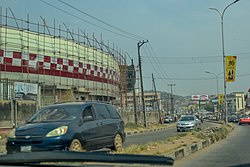Construction
The stadium was opened in 1960 [2] during the tenure of Chief Obafemi Awolowo who was serving as the Premier of the Western Region at the time. It was named Liberty Stadium in honor of Nigeria's independence. Constructed by direct labour under the supervision of the regional Ministry of Works and Transport, the stadium was the central location of sports in the old Western region of Nigeria. It was sited at the southern end of Ibadan in 1960 near the summit of a hill, and located close to a bypass that leads to the Ibadan-Abeokuta and Ibadan-Lagos roads. [3]
At its inception, besides the football pitch in the main bowl with floodlights, the stadium boasted the indoor sports halls, swimming pool, courts for tennis, volleyball, handball, basketball, hockey, etc. [4]
Renaming
On November 12, 2010, the stadium was renamed as the Obafemi Awolowo Stadium. [6] The renaming of the stadium was announced by the then Nigerian president, Dr. Goodluck Jonathan, when he visited Chief Obafemi Awolowo's widow, Chief (Mrs.) Hannah Awolowo. [7]
Revitalization of Obafemi Awolowo Stadium
In 2024, the National Sports Commission (NSC) announced a partnership with Tripple 44 Football Academy to revamp an underutilized section of the Obafemi Awolowo (Liberty) Stadium, Ibadan. The project, spearheaded by Tripple 44 Academy CEO Olatunji Okuku, aims to transform a former dump site into a modern football facility.
Okuku emphasized the significance of the initiative, stating, “We saw immense potential in this site, which has been lying fallow and, at one point, became a hideout for kidnappers. This facility will be a game-changer for grassroots football in Ibadan and across Nigeria.” The project includes an 11-a-side football pitch and a 7-a-side mini-pitch, supporting grassroots development and talent discovery.
NSC Chairman Shehu Dikko praised the collaboration, highlighting the importance of private-sector involvement in sports infrastructure development. Tripple 44 Academy has committed to fully funding and maintaining the facility, aligning with efforts to enhance Nigeria’s sports infrastructure.

